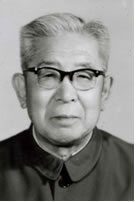
Professor Jia Lanpo (Chinese: 贾兰坡, November 25, 1908 - July 8, 2001) was one of China's leading archaeologists and a director of the Peking man excavation. Professor Jia was one of the founders of Chinese anthropology.
He graduated from the Huiwen High School of Beijing in 1929 and went on to work as a trainee at the Cenozoic Research Laboratory of the Geological Survey of China. In April 1931 he joined the excavation at Peking Man in Zhoukoudian where he worked with many of the biggest names in anthropology of his era, including Pierre Teilhard de Chardin, Henri Breuil, Davidson Black, Franz Weidenreich and Pei Wenzhong whom he replaced as the head of Zhoukoudian excavations in 1935.
Working at the site, Professor Jia helped unearth 45 Homo erectus fossils, more than any site in the world has produced, collectively known as the Peking man fossils. Professor Jia studied the fossils to piece together how hominids in the region evolved and supported the theory that modern Chinese could be traced from them.
Most of the remains were lost in World War II, when, in an attempt to safeguard them from the Japanese invaders, American marines tried to deliver them to a ship bound for the United States and the American Museum of Natural History. What happened to them remains a mystery. But casts of the fossils were made, based in part on the work of Professor Jia, a meticulous record keeper. He managed to protect thousands of notes, letters and 2,000 photographs and negatives of the excavation at home in Beijing.
After the Peking man work, Professor Jia led and participated in excavations of several Pleistocene sites in China. In 1990, he directed a Chinese-American excavation in the Nihewan Basin of northern China with help from J. Desmond Clark, an archaeologist who specializes in Africa.
Throughout his career, Professor Jia was a prolific writer and published more than 180 papers, many focusing on the behavioral and morphological evolution of hominids in China. He wrote two well-known books, including ''Chinese Homo Erectus'' (1950) and ''Early Man in China'' (1980).